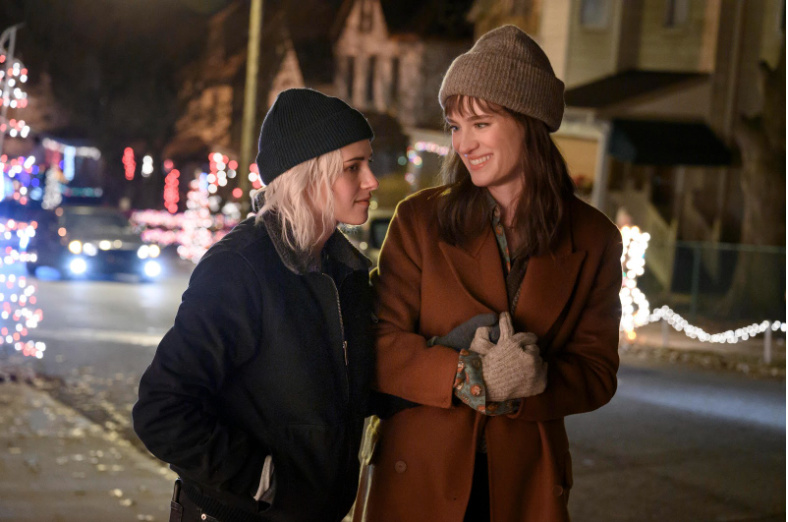The holiday season has come and gone, but I still have something to say about “Happiest Season.”
BY // HANNAH KRANTZ
Like many young queer people, I was excited and optimistic to hear about Netflix’s new gay Christmas movie “Happiest Season.” I never expected it to be hailed as an intersectional piece of representation– especially after watching the trailer, which was full of stereotypes and predictable holiday cliches — but at the very least, I expected to see a happy lesbian couple doing cute holiday stuff together. Movies centered around queer people are so often filled with suffering due to lack of acceptance or internalized homophobia that I, a Jew, was genuinely excited to see a silly little Christmas movie about lesbians that was sure to have a happy ending.

At the very least, I reasoned, I’d get to see Kristen Stewart and Aubrey Plaza in suits. As it turns out, that was one of the few things I actually enjoyed from this film. I had to overlook a lot more than the expected reliance on stereotypes, fake snow and cookie-cutter plot points to enjoy the movie, or even root for the happiness of a main character.
From the start, our protagonists don’t make a very realistic queer couple. Abby, played by Kristen Stewart, has been comfortably out as gay since high school. Harper, played by Mackenzie Davis, plans to take Abby home for the holidays to meet her family and teach her the magic of Christmas. Abby plans to propose to Harper. All good, expected Christmas-romcom fun. Suddenly, when they’re 10 minutes away from Harper’s childhood home, Harper pulls over and confesses that she’s been lying to Abby for months– she never actually came out to her parents, and Abby has to pretend to be her roommate, leaving Abby no choice but to go back in the closet. We then learn that Harper told Abby almost a year ago that she had come out to her family, told them about her relationship, and that they were all accepting. Abby confesses that it was all a lie, that she never came out, and her family doesn’t even know Harper exists.

This huge lack of communication makes absolutely no sense for any realistic long-term gay relationship. No matter how easy someone’s personal coming out story may be, every LGBT+ person knows how terrifying, life-changing, and potentially traumatizing coming out can be. Part of the love and communication shared between queer people is understanding this. Before Harper’s fake coming out, the two must have had many conversations about being gay and self-acceptance, making it all the more unrealistic for Harper to keep this information from Abby until the very last second. No matter how scared she was, this was a horrible move.
This level of dishonesty and deceit about such a delicate queer topic is not the kind of dilemma you can drop into the Couple Has A Problem part of a rom-com formula. It just proves right off the bat that their relationship isn’t very strong.
Harper becomes a worse and worse girlfriend as the movie progresses, and it becomes harder to root for her happiness, much less relate to her as LGBT representation. Some of her actions seem justified as she pretends to be straight in front of her family: she sleeps in a different room than Abby, she allows her mom to go on and on about setting her up with her high school boyfriend, she doesn’t stick by Abby’s side as they go about their holiday errands. Some of her actions, however, just make her look like a bad girlfriend: she continues not to communicate with Abby, ignores her to hang out with her hometown friends, and stays with her aforementioned high school boyfriend at a bar all night.
MAJOR SPOILERS AHEAD
My real dissatisfaction with “Happiest Season” came from the climax of the plot and the way it was resolved. The movie sticks hard to its silly, even slapstick comedic tone throughout, making it easy for a heterosexual audience to breeze past the genuinely traumatic scenes and feel satisfied by a happy ending. However, as a queer person, watching Harper get outed by her sister, hearing her swear she was straight and that Abby was just her roommate while Abby sat and watched, and then seeing Harper’s father scowl in disappointment when he eventually finds out Harper actually is gay… I couldn’t just laugh and move on.
One of my friends declared the film’s ending felt like “trauma porn.” Harper’s outing is the culmination of a fight she’s been having with her sister. Their sibling rivalry quickly takes a turn from silly and lighthearted to truly horrible when Harper’s sister catches her kissing Abby and then uses it against her in an explosive argument during the family Christmas party in front of dozens of people. I cannot overstate how absolutely terrifying that is. That is the kind of thing that changes the trust in a sibling relationship forever. However, the moment isn’t even highlighted as the scene quickly divulges back into slapstick silliness with Harper physically fighting both of her sisters at once. As I watched three grown women roll on top of each other, Christmas tree twinkling, guests watching in shock, I wondered: how on earth can this be resolved in the last 20 minutes of this movie?

The comedic atmosphere of this movie supports the cookie-cutter formula of “family goes through trouble and stress, but it’s all resolved because we’re together on the holidays.” Using this formula but swapping out the trouble and stress for being shoved back into the closet against your will or being outed by someone you thought you could trust doesn’t make for lighthearted, easily-resolved holiday cheer. “Happiest Season” reminds us that queer love stories don’t easily fit into a mold created for heterosexual couples.
But hey. Kristen Stewart and Aubrey Plaza in suits.

